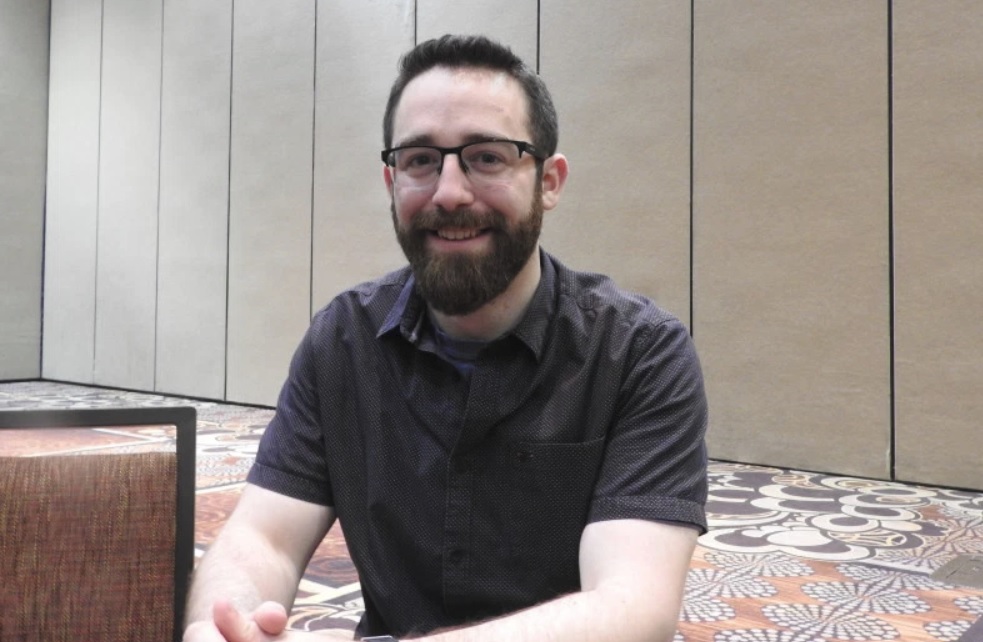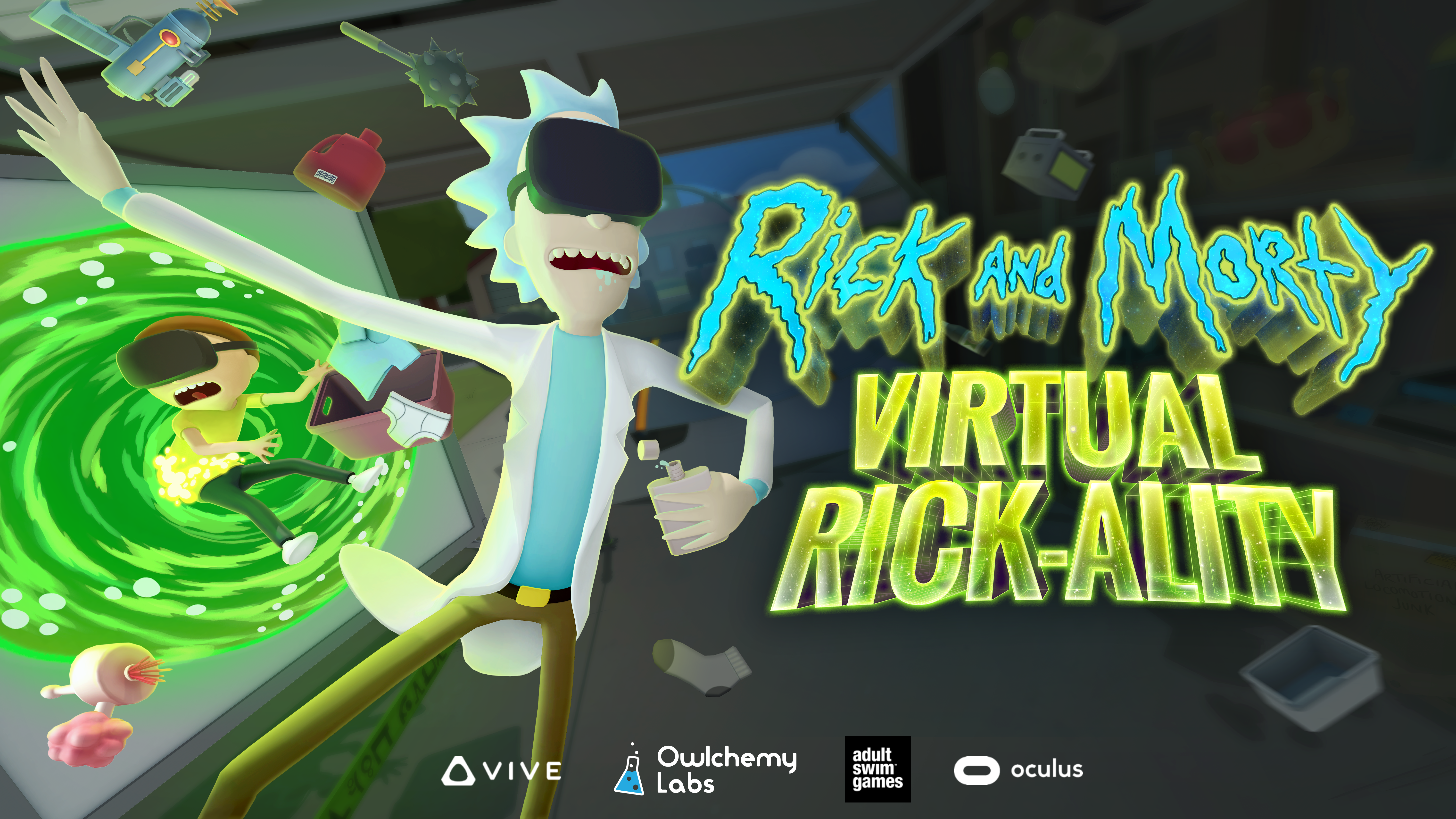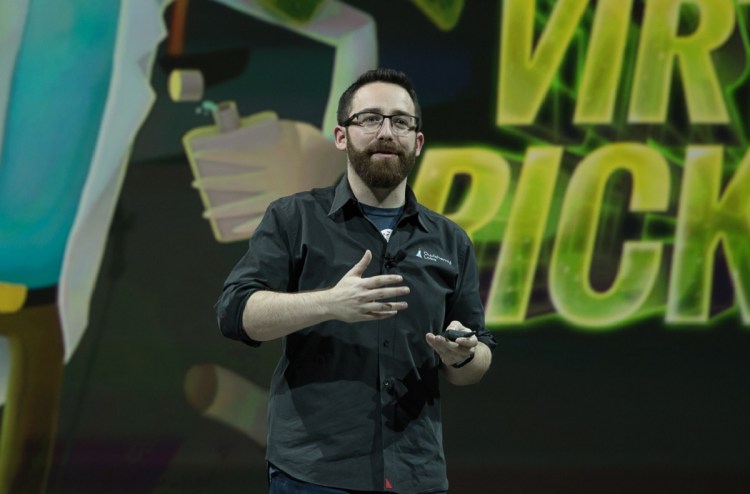testsetset
Alex Schwartz, the CEO of Owlchemy Labs, has made virtual reality look easy. His company’s debut game, Job Simulator, is one of the big hits among VR games. Owlchemy followed that with Rick and Morty: Virtual Rick-ality, and now it is working on Vacation Simulator.
And while other VR game companies are struggling to get by, Owlchemy has already had an exit. Google purchased the company — the only game studio that the big search company has acquired — and Owlchemy is still doing what it does.
But Schwartz, who gave a talk at the recent DICE Summit gaming event in Las Vegas, said it’s easy to make mistakes. He talked about them during his talk and an interview afterward. Making the first VR game, Schwartz said, “was like, let’s erase everything we knew about game development and game design, all our expectations, and start over.”
Here’s an edited transcript of our interview.

Above: Alex Schwartz is CEO of Owlchemy, creator of the Job Simulator VR game.
GamesBeat: Tell me about your talk.
Alex Schwartz: My talk started with talking about what we’ve done. A lot of people were curious about how it was that a small studio went from making PC and mobile games into being the people who are maybe most known for high-quality VR. I went through the story of originally doing the port of Aaaaa! for Oculus, and then Chet giving us the original Vive and involving us there. The process of not having any sample code or any games or any idea of what could work on the Vive. That’s when we figured out picking up blocks. Using your hands was a lot of fun, so we built a game around that.
The thing that I’ve found — you have to re-create the world view of how players interact with items and make everything that they expect to function, everything that looks like it’s grabbable, you have to make all those fantasies fulfilled. Otherwise you get interaction disappointment. If there’s something stuck to table, an apple or whatever, and you can’t grab it, it’s so disappointing to your brain.
I went through a lot of the details of that, the intricacies of what it feels like and how you remove something from a game if it doesn’t fit that world view. If I can pick up a cup, that’s good, but if there’s also running water, I need to be able to put the cup under the water and have it fill. All those things have to work.
GamesBeat: And your tips?
Schwartz: I talked about a lot of tips and tricks around interaction, how hands are so magical. A lot of little stories about how our brains get sold so intensely on VR that it passes the bar of, “Oh, I’m in an interesting interactive space.” I feel like I’m truly there. My brain thinks I’m there. I open my mouth when I eat a donut. I tiptoe around the broken glass on the floor, even though it’s not real.
The end is a takeaway to developers and publishers and people in the VR industry. We shouldn’t be building content to mitigate risk. I know it’s hard right now to build VR. It’s expensive. It’s tough to innovate and come up with new ways of interaction, new ways to do things we’ve always done. How do you do a menu? We did the exit burrito, instead of just making a 2D menu. It’s expensive and time-consuming, but it’s better to build from the ground up, to erase everything we’ve known about games and find out what’s best for VR.
You can’t just take an existing piece of content and add VR controls or VR view in to something that was already built for PC or mobile or console. It leads to lower-quality experiences that feel tacked on. VR feels like an afterthought. A lot of triple-A games have done that in this past holiday season. We need to focus on innovating and building from the ground up.
It’s just like mobile. The first year and a half, two years of mobile touch screen games, it was just taking existing projects to mobile. That’s how you end up with virtual buttons on a phone. It’s never going to be a good experience. It took about two years. Then you ended up with Angry Birds and all these other games that take advantage of what’s great about a touch screen. That’s what’s happening with VR. You don’t want ports. You want original stuff. It takes time and effort. It takes a common, shared language.
The things that are going to be remembered about VR 10 years from now — it’s going to be the content that only worked in VR. Not the crossovers. “You can play it on your PlayStation with a controller, and you can play it in VR.” No, it should be native to VR.

Above: Job Simulator is a launch title on the HTC Vive.
GamesBeat: VR seems to be at this point where it’s still really beneficial to offer case studies for people who don’t know how to think about it or how to get into it. You guys have something that worked.
Schwartz: That’s essentially all the talks we give. We go up and say, “This worked. This didn’t. This might work in your case, or it might not.” We get as many tips and data out there, because it’s better for the industry than if we were to just keep it to ourselves.
GamesBeat: I remember in the early days of the iPhone, Pocket God was successful. It was just two guys on their own. They went through the patterns of how users came in and then money came in as they offered updates and changed things. That was fresh information still, realizing that these frequent updates created re-engagement.
Schwartz: Right. That was a brand new concept. We talk partly about design inspiration, and partly inspiration for what we could all build if we could put our minds to it.
GamesBeat: How is Vacation Simulator coming along?
Schwartz: It’s coming along very well. That’s our primary project right now. You saw the announcement at the game awards. That was cool. It’s a new tier for us, to get up in front of 10 million people watching. We showed our teaser, which doesn’t say much other than the name and the very short concept. At GDC we’re going to be revealing a lot more about what this is. I can’t say too much about it, because that’s our moment, but there will be something playable, and I think we’re going to surprise a lot of people. It’s not just Job Simulator on a beach. It’s totally different in a way that will be surprising.
GamesBeat: You pulled Rick and Morty in as well. In what way has that been different?
Schwartz: With every game we’ve gotten one level deeper, kind of. We achieved a good interaction in a single-player game with Job Simulator. Now let’s try to move around a slightly larger space. Maybe add some puzzle mechanics and see if that formula can work on a bigger stage. There’s more in what’s going on with Vacation Simulator. The tech all goes into a toolbox as you learn more about quality interactions.
From a design standpoint, the more you see people playing VR, the more you realize what human tendencies apply universally. People want to do things like this. People want to be challenged in this way. Now that we have more data and more understanding of what’s fun, what people want, we’re doing a lot more to make a bigger world with more to do that you’ll come back to. It doesn’t feel like it’s a launch title, the first thing anyone came up with. It’s maturing a bit.

Above: Rick and Morty: Virtual Rick-ality in action.
GamesBeat: Was there a reason to be inside? What made you guys think that was where you could be at your creative best?
Schwartz: For us, the goal with Owlchemy has always been to create multiplatform titles. Specifically, we want to be everywhere. We don’t want to be platform-locked. We want to make multiplatform, creative, original titles. We want to be able to affect the VR industry and push it forward. You can’t do that if you go out of business.
We know that this is a long play for VR. There have been a lot of conversations about whether we hit the targets for industry size that we’re looking for. This is exactly where I thought the size of VR would be, yet a lot of analysts predicted it would go way faster. I just think that was the issue, not that the industry should be going faster. It was just that the predictions were too aggressive. I think we’re exactly where we need to be, which means, if you believe that, you know that you need to last through a number of years to get to a point where I can put $20 million in a game and make that back.
Is that a year from now? Two years? Three years? It’s not a matter of, will VR take off? It’s a matter of when. Google is a lot of support and backing and long-term matching of vision. Now that we’re with them, we know they’re on board for the future of VR in the long term. So are we. We can focus on creating original stuff without worrying every day. “Are we making sure that we don’t go out of business?”
GamesBeat: It’s interesting to wind up at a platform company instead of a game company.
Schwartz: We’re the first game studio that Google has ever owned. When you look at the field of potential acquirers for a VR game studio, there are very few that would understand the vision and align with multiplatform and long-term interaction like we think of. Google fits that perfectly. It was a good match.
GamesBeat: As far as continued support for multiple platforms, that’s okay for you guys?
Schwartz: We focus on six degrees of freedom hardware. When we announced Vacation Simulator, right in the trailer it says PSVR, Vive, Oculus Touch. We want our things to be everywhere you can reach out and pick up an item. That’s the goal. Right now that’s those platforms and so that’s where we’re shooting.
GamesBeat: Is it getting hard to define the second generation of VR? I wonder what you would want in that. You seem to have a lot of different options, and some of them conflict with each other. You have urge to do it more cheaply, but also to get more features in.
Schwartz: Someone could ask what are the specs you want the most, and forget anything that has to do with price. The highest resolution, the lowest latency, the most amazing tracking, and it’ll be thousands of dollars. That’s not going to help consumer adoption. It’s always a balancing game. What do you improve and what becomes a tradeoff?
I’ve said before that I believe that onboarding friction is the number one thing keeping us from having a larger user base. Price is going down. The market will get wider. Right now, though, if I have to boot up Windows and update my Nvidia drivers—it’s a lot of setup and prep. I can’t recommend to a non-technical family member that they set up this whole thing on a custom PC.
When we get to the point where we have something that’s more stand-alone, or fully self-contained—this product does VR, and I can pick it up and turn it on and it’s tracking, it does what I want. That’s a great future. But again, you run up against cost. It’s a matter of when, not if, but is that next year? Two years from now? We don’t know, but we know that making good content that uses your hands to interact will work universally with whatever’s coming next. We’ll just focus on content, and some smart companies out there will make hardware we can launch on.

